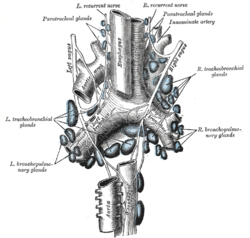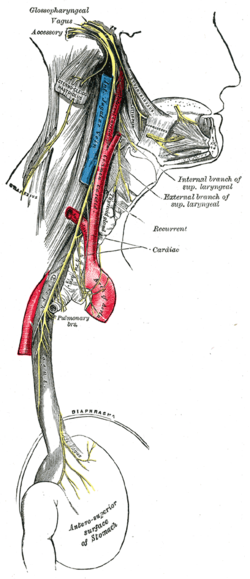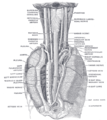- Recurrent laryngeal nerve
-
Nerve: Recurrent laryngeal nerve 
POSTERIOR VIEW: The tracheobronchial lymph glands (I. and E. Recurrent nerves visible at top.) 
Course and distribution of the glossopharyngeal, vagus, and accessory nerves. Latin nervus laryngeus recurrens Gray's subject #205 912 Innervates larynx
posterior cricoarytenoid
lateral cricoarytenoid
arytenoid
thyroarytenoidFrom vagus nerve "Recurrent nerve" redirects here. For the supply to the thenar eminence, see recurrent branch of the median nerve.The recurrent (inferior) laryngeal nerve is a branch of the vagus nerve (tenth cranial nerve) that supplies motor function and sensation to the larynx (voice box). It travels within the endoneurium. It is the nerve of the 6th Branchial Arch.
Contents
Path
It is referred to as "recurrent" because the branches of the nerve innervate the laryngeal muscles in the neck through a rather circuitous route: it descends into the thorax before rising up between the trachea and esophagus to reach the neck.
The left laryngeal nerve, which is longer, branches from the vagus nerve to loop under the arch of the aorta, posterior to the ligamentum arteriosum before ascending. On the other hand, the right branch loops around the right subclavian artery. As the recurrent nerve hooks around the subclavian artery or aorta, it gives off several cardiac filaments to the deep part of the cardiac plexus. As it ascends in the neck it gives off branches, more numerous on the left than on the right side, to the mucous membrane and muscular coat of the oesophagus; branches to the mucous membrane and muscular fibers of the trachea; and some pharyngeal filaments to the superior pharyngeal constrictor muscle.
The nerve splits into anterior and posterior rami before supplying muscles in the voice box – it supplies all laryngeal muscles except for the cricothyroid, which is innervated by the external branch of the superior laryngeal nerve.
The recurrent laryngeal nerve enters the pharynx, along with the inferior laryngeal artery and inferior laryngeal vein, below the inferior constrictor muscle to innervate the Intrinsic Muscles of the larynx responsible for controlling the movements of the vocal folds.
Clinical significance
The nerve is best known for its importance in thyroid surgery, as it runs immediately posterior to this gland. If it is damaged during surgery, the patient will have a hoarse voice. Nerve damage can be assessed by laryngoscopy, during which a stroboscopic light confirms the absence of movement in the affected side of the vocal cords.
Similar problems may also be due to invasion of the nerve by a tumor or after trauma to the neck. A common scenario is paralysis of the left vocal cord due to malignant tumour in the mediastinum affecting the left branch of the recurrent laryngeal nerve. The left cord returns to midline where it stays.
- If the damage is unilateral, the patient may present with voice changes including hoarseness.
- Bilateral nerve damage can result in breathing difficulties and aphonia, the inability to speak.
- The right recurrent laryngeal nerve is more susceptible to damage during thyroid surgery due to its relatively medial location.
History
Galen is said to have first described the clinical syndrome of recurrent laryngeal nerve paralysis.
Veterinary medicine
In Veterinary medicine, 'roars' refers to a deficit in the left recurrent laryngeal nerve causing characteristic stertorous sounds upon inspiration.
It is treatable by specialists in equine medicine.
Evidence of evolution
The extreme detour of this nerve (over fifteen feet in giraffes) is cited as evidence of evolution as opposed to intelligent design. The nerve's route would have been direct in the fish-like ancestors of modern tetrapods, traveling from the brain, past the heart, to the gills (as it does in modern fish). Over the course of evolution, as the neck extended and the heart became lower in the body, the laryngeal nerve was caught on the wrong side of the heart. Natural selection gradually lengthened the nerve by tiny increments to accommodate, resulting in the absurdly circuitous route now observed, which, if designed, could only be described as unintelligent.[1]
References
- ^ Dawkins, Richard (2009). "11. History written all over us". The greatest show on Earth. New York: Free Press. pp. 360–362. ISBN 9781416594789. http://books.google.com/books?id=U8AFxmc76rcC. Retrieved November 21, 2009.
Additional images
External links
- 369492028 at GPnotebook
- SUNY Figs 21:04-01
- cranialnerves at The Anatomy Lesson by Wesley Norman (Georgetown University) (X)
- Example of Vocal Cord Paralysis
- Disection of a giraffe displaying the laryngeal nerve
Nerves of head and neck: the cranial nerves and nuclei (TA A14.2.01, GA 9.855) olfactory (AON->I) optic (LGN->II) oculomotor
(ON, EWN->III)trochlear (TN->IV) no significant branchestrigeminal
(PSN, TSN, MN, TMN->V)abducens (AN->VI) no significant branchesfacial (FMN, SN, SSN->VII) near origininside
facial canalvestibulocochlear
(VN, CN->VIII)glossopharyngeal
(NA, ISN, SN->IX)before jugular fossaafter jugular fossavagus
(NA, DNVN, SN->X)before jugular fossaafter jugular fossapharyngeal branch (pharyngeal plexus) · superior laryngeal (external, internal) · recurrent laryngeal (inferior) · superior cervical cardiacaccessory (NA, SAN->XI) hypoglossal (HN->XII) Categories:- Cranial nerves
- Human throat
Wikimedia Foundation. 2010.



